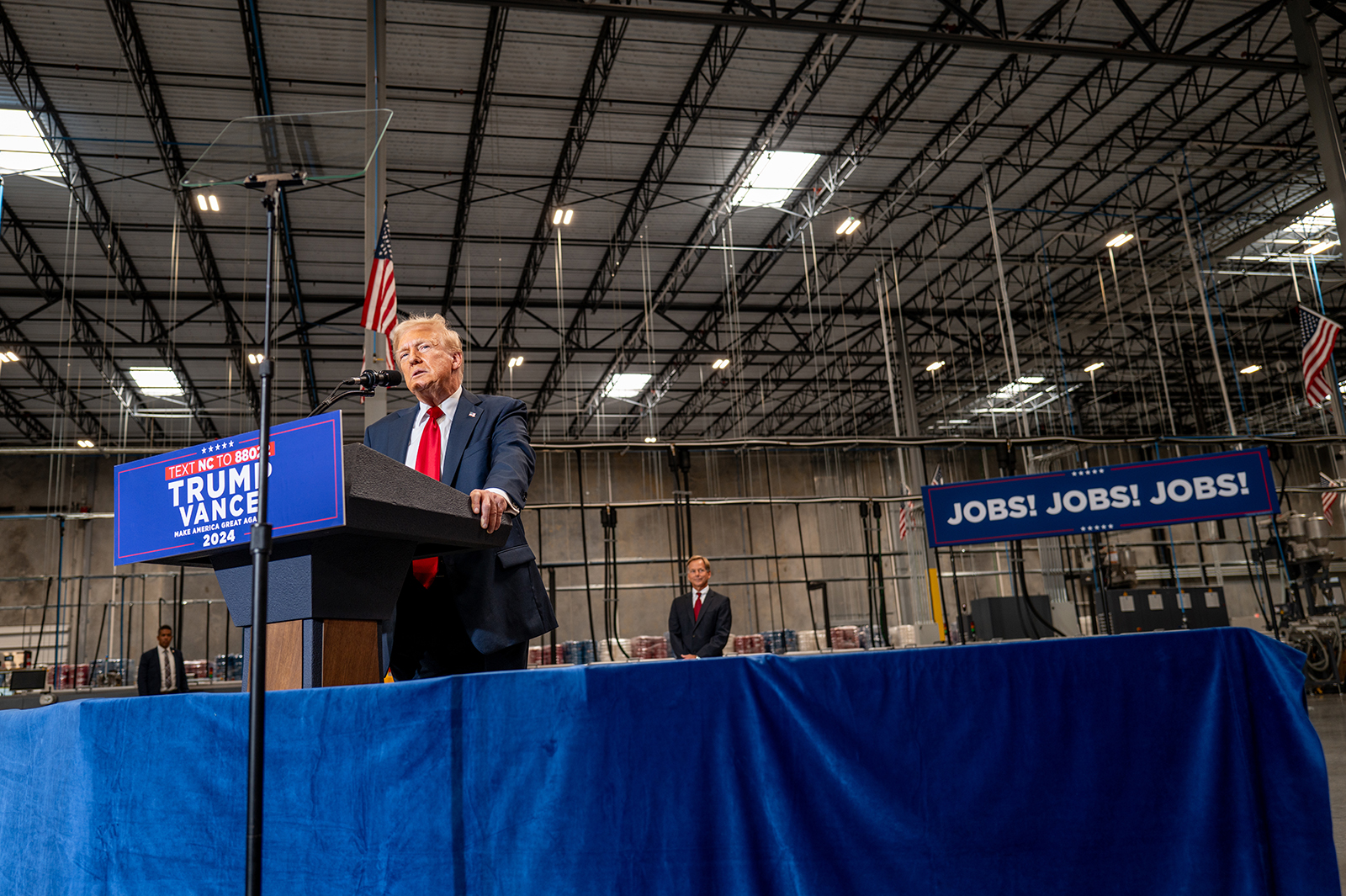By John T. Bennett
CQ-Roll Call
(TNS)
Former President Donald Trump and Vice President Kamala Harris on Wednesday were in battleground states each must win to become president, as the nominees clashed over their visions for managing the economy.
A main theme from the White House hopefuls all week has been U.S. manufacturing, with Harris on Wednesday pitching a “pragmatic” approach and Trump a day earlier vowing a “manufacturing renaissance.”
Before Harris appeared Wednesday at the Economic Club of Pittsburgh, her campaign aides issued a memo amid calls for her to explain her approach to managing the economy. The missive promised she would “pursue practical, realistic solutions, instead of being bound by ideology.”
Trump has reaffirmed his mercantilist views, vowing stiff tariffs on goods made by allies and foes that do not bend to his economic and trade demands. The Harris campaign memo—as well as her speech later in the day—showed how the Democratic nominee has opted for general proposals meant to appeal to a broad swath of voters.
“The American people face a choice between two fundamentally very different paths for our economy. I intend to chart a new way forward and grow America’s middle class. Donald Trump intends to take America backward to the failed policies of the past,” Harris said.
“Look, I’m a capitalist. I believe in free and fair markets,” she added. “I believe in consistent and transparent rules of the road.”
During her speech, Harris promised to lower costs, slash middle-class tax rates and fight alleged price-gouging by large corporations. She also said her administration would cut the costs of child and elder care, and expand access to paid leave.
She vowed to “cut the red tape that stops homes from being built,” and repeated her call for 3 million new housing units for renting and purchase, as well as down-payment assistance for first-time buyers and lowered prescription drug costs. She also repeated her pitch to increase federal assistance to those trying to start a small business, and said she would push to alter tax laws in ways aimed at making it easier for “businesses to let workers share in their company’s success.”
“It’s not about politics. It’s not about ideology,” she said to applause. “From my perspective, it’s just common sense.”
Harris had a razor-thin lead in FiveThirtyEight’s average of recent polling in the Keystone State. Most prognosticators have said she needs the commonwealth to get to the 270 Electoral College votes to become president.
The former president spoke earlier Wednesday in Mint Hill, N.C., a suburb of Charlotte, the state’s largest city and biggest media market. His remarks leap-frogged from topic to topic—a speaking style he recently, after nine years in politics, dubbed “the weave”—though he did push his economic blueprint.
Trump began his remarks at a manufacturing facility, saying its owner greeted him by crediting his first-term tariffs with transforming the operation from an “empty hulk” to a “thriving business.” About those import fees, Trump vowed to do them on a “much, much larger scale,” if elected in November.
“Today, Kamala Harris is supposedly announcing her so-called plans to support manufacturing and wealth creation. Why didn’t she do it three-and-a-half years ago? They’ve done nothing.
“A lot of people think we won’t have the [global] reserve currency if we lose—that’s like the equivalent of losing a war. If I’m elected president, we will have the world’s reserve currency in better shape and order every country to follow it. And if they don’t, we will put tariffs on that country, and we won’t trade with that country. … It’s so easy, but you need the right messenger.”
Trump again vowed to take jobs from other countries, including a Wednesday vow to bring furniture jobs back to North Carolina—notably, however, the Mint Hill audience did not cheer the line.
Later in Pittsburgh, Harris said Trump “got played by China” and “was one of the biggest losers on manufacturing” while president.
Trump had a paper-thin advantage in the Tar Heel State, according to FiveThirtyEight. He won the state in 2016 and 2020.
‘Define the next century’
The rivals offered their differing visions as polls continued to show Trump with an advantage on the economy 40 days from Election Day. Trump held a 50 percent to 39 percent edge on handling the economy in a CNN-SSRS poll of likely voters conducted Sept. 19-22. Among registered voters, the same survey gave the Republican standard-bearer a slightly larger edge, 51 percent to Harris’ 37 percent.
Trump has been successful—during first his campaign against President Joe Biden, before he ended his bid for another term, and against Harris since she became the nominee—at capitalizing on voter perceptions they were better off under his term. But economic data does not always support his claims nor voters’ feelings.
Take manufacturing sector jobs. “The trend under both Presidents Trump and Biden followed a similar pattern: two years of growth after an economic downturn, followed by job losses in the third year,” according to analysts at FactCheck.org. “Comparing the raw numbers, Biden has seen an average monthly increase of 18,200 manufacturing jobs per month, compared to 11,600 per month pre-pandemic under Trump.
“Under Biden, industrial production rose until the fall of 2022 and has remained relatively stagnant ever since,” FactCheck added. “The reality is that the manufacturing report cards for the Trump and Biden administrations are mixed.”
For his part, Biden appeared on ABC’s “The View” program before either of his would-be replacements spoke. He spent part of that interview touting his record and trying to boost Harris.
The outgoing president described Harris as “smart as hell” and as “bright, tough and honorable,” saying she shared his “optimistic view of the future.” Still, Biden said even when he dropped out on July 21, he thought he could have beaten Trump, saying he decided to end his reelection bid because he had not had ample time to think about whether it was the right time to “pass the torch.”
While the 78-year-old Trump spoke of reviving former industries, like furniture-building in North Carolina, the 59-year-old Harris pitched investing in “the sectors that will define the next century.”
“We will invest in biomanufacturing and aerospace to remain dominant in AI and quantum computing, blockchain and other emerging technologies, expand our lead in clean energy innovation and manufacturing,” Harris said, “so the next generation of breakthroughs from advanced batteries to geothermal to advanced nuclear are not just invented, but built here, in America by American workers.”
_______
©2024 CQ-Roll Call Inc., All Rights Reserved. Visit cqrollcall.com. Distributed by Tribune Content Agency LLC.
Thanks for reading CPA Practice Advisor!
Subscribe Already registered? Log In
Need more information? Read the FAQs




